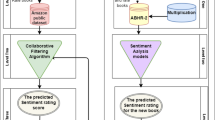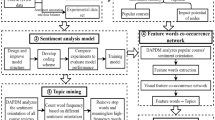Abstract
Nowadays, online course recommendation frameworks are popular for suggesting courses to new learners. Various courses are available on the Internet, and it is very challenging to suggest optimal learning courses for learners. This work presented an effective online course recommendation with sentiment analysis using hybrid similarity based approaches. Initially, the input text online course data is pre-processed using tokenization, stop word removal, Stemming, noise filtering, and lemmatization processes. Then, effective features like Lexicon combined TF-IDF feature, Word2vector features, N-gram feature, and Glove feature are extracted from the pre-processed data. Subsequently, the improved horse herd Optimization (IHHO) algorithm is utilized to select features optimally. Afterwards, a hybrid Bidirectional long short term memory-convolutional neural network (Hybrid BLSTM-CNN) is presented to classify courses into positive, negative and neutral for the sentiment analysis of courses. Here, the adaptive salp swarm emperor penguin optimization (ASEP) approach is utilized to update the optimized weights of the hybrid classifiers. Finally, the hybrid content-collaborative similarity (Hybrid-CCS) approach is considered for an optimal course recommendation. The experimental results of the developed approach outperformed the compared existing schemes in terms of accuracy (99.79%), F1-score (99.648%), Kappa (99.061%), RMSE (0.2092), precision (99.69%), recall (99.698%), MAE (0.012), HR (0.9321) and ARHR (0.1621) and AUC (99.79%).


















Similar content being viewed by others
Data availability
Data sharing is not applicable to this article.
References
Aldowah H, Al-Samarraie H, Alzahrani AI, Alalwan N (2020) Factors affecting student dropout in MOOCs: a cause and effect decision-making model. J Comput High Educ 32:429–454
Ali W (2020) Online and remote learning in higher education institutes: A necessity in light of COVID-19 pandemic. High Educ Stud 10(3):16–25
Ali S, Hafeez Y, Humayun M, Jamail NSM, Aqib M, Nawaz A (2022) Enabling recommendation system architecture in virtualized environment for e-learning. Egypt Inf J 23(1):33–45
Aljawarneh SA (2020) Reviewing and exploring innovative ubiquitous learning tools in higher education. J Comput High Educ 32:57–73
Alqurashi E (2019) Predicting student satisfaction and perceived learning within online learning environments. Distance Educ 40(1):133–148
Ayu M (2020) Online learning: leading e-learning at higher education. The J Engl Lit Educ The Teach Learn Engl Foreign Lang 7(1):47–54
Campos R, dos Santos RP, Oliveira J (2020) A recommendation system enhanced by topic modeling for knowledge reuse in MOOCs ecosystems. In reuse in intelligent systems, CRC press 116-142
Castro MP, Zermeno MGG (2020) Challenge based learning: innovative pedagogy for sustainability through e-learning in higher education. Sustain 12(10):4063
Hussain M, Zhu W, Zhang W, Abidi SMR (2018) (2018) Student engagement predictions in an e-learning system and their impact on student course assessment scores. Computa Intell Neurosci
Jena KK, Bhoi SK, Malik TK, Sahoo KS, Jhanjhi NZ, Bhatia S, Amsaad F (2022) E-learning course recommender system using collaborative filtering models. Electron 12(1):157
Jiang W, Pardos ZA, Wei Q (2019) Goal-based course recommendation. In proceedings of the 9th international conference on Learning Analytics & Knowledge 36-45
Kassymova G, Akhmetova A, Baibekova M, Kalniyazova A, Mazhinov B, Mussina S (2020) E-learning environments and problem-based learning. Int J Adv Sci Technol 29(7):346–356
Khalid A, Lundqvist K, Yates A, Ghzanfar MA (2021) Novel online recommendation algorithm for massive open online courses (NoR-MOOCs). PLoS One 16(1):e0245485
Khamparia A, Singh SK, Luhach AK, Gao XZ (2020) Classification and analysis of users review using different classification techniques in intelligent e-learning system. Int J Intell Inf Database Syst 13(2–4):139–149
Khanal SS, Prasad PWC, Alsadoon A, Maag A (2020) A systematic review: machine learning based recommendation systems for e-learning. Educ Inf Technol 25(4):2635–2664
Koffi DDASL, Ouattara N, Mambe DM, Oumtanaga S, Adje A (2021) Courses recommendation algorithm based on performance prediction in E-learning. IJCSNS 21(2):148–157
Lemay DJ, Doleck T (2020) Predicting completion of massive open online course (MOOC) assignments from video viewing behavior. Interact Learn Environ:1–12
Lin Y, Feng S, Lin F, Zeng W, Liu Y, Wu P (2021) Adaptive course recommendation in MOOCs. Knowl-Based Syst 224:107085
Madani Y, Ezzikouri H, Erritali M, Hssina B (2020) Finding optimal pedagogical content in an adaptive e-learning platform using a new recommendation approach and reinforcement learning. J Ambient Intell Humaniz Comput 11(10):3921–3936
Maldonado-Mahauad J, Pérez-Sanagustín M, Kizilcec RF, Morales N, Munoz-Gama J (2018) Mining theory-based patterns from big data: identifying self-regulated learning strategies in massive open online courses. Comput Hum Behav 80:179–196
Muzaffar AW, Tahir M, Anwar MW, Chaudry Q, Mir SR, Rasheed Y (2021) A systematic review of online exams solutions in E-learning: techniques, tools, and global adoption. IEEE Access 9:32689–32712
Nafea SM, Siewe F, He Y (2019) On recommendation of learning objects using felder-silverman learning style model. IEEE Access 7:163034–163048
Oladipo ID, Awotunde JB, AbdulRaheem M, Ige OO, Balogun GB, Tomori AR, Taofeek-Ibrahim FA (2021) An improved course recommendation system based on historical grade data using logistic regression. In International conference on applied informatics, Springer, Cham 207–221
Pillutla VS, Tawfik AA, Giabbanelli PJ (2020) Detecting the depth and progression of learning in massive open online courses by mining discussion data. Technol Knowl Learn 25(4):881–898
Purwoningsih T, Santoso HB, Hasibuan ZA (2019) Online learners’ behaviors detection using exploratory data analysis and machine learning approach. In 2019 fourth international conference on informatics and computing (ICIC), IEEE 1-8
Rezaeimehr F, Moradi P, Ahmadian S, Qader NN, Jalili M (2018) TCARS: time-and community-aware recommendation system. Futur Gener Comput Syst 78:419–429
Saleem F, Ullah Z, Fakieh B, Kateb F (2021) Intelligent decision support system for predicting Student’s E-learning performance using ensemble machine learning. Math 9(17):2078
Shahbazi Z, Byun YC (2020) Toward social media content recommendation integrated with data science and machine learning approach for E-learners. Symmetry 12(11):1798
Shi D, Wang T, Xing H, Xu H (2020) A learning path recommendation model based on a multidimensional knowledge graph framework for e-learning. Knowl-Based Syst 195:105618
Wang J, Xie H, Wang FL, Lee LK, Au OTS (2021) Top-N personalized recommendation with graph neural networks in MOOCs. Comput Educ Artif Intell 2:100010
Zhang T, Shaikh ZA, Yumashev AV, Chłąd M (2020) Applied model of E-learning in the framework of education for sustainable development. Sustain 12(16):6420
Zheng F (2022) Personalized education based on hybrid intelligent recommendation system. J Math 2022:1–9
Funding
No funding is provided for the preparation of manuscript.
Author information
Authors and Affiliations
Contributions
All authors have made equal contributions.
Corresponding author
Ethics declarations
Conflict of interest
Authors declare that they have no conflict of interest.
Ethical approval
This article does not contain any studies with human participants or animals performed by any of the authors.
Consent to participate
All the authors involved have agreed to participate in this submitted article.
Consent to publish
All the authors involved in this manuscript give full consent for publication of this submitted article.
Additional information
Publisher’s note
Springer Nature remains neutral with regard to jurisdictional claims in published maps and institutional affiliations.
Rights and permissions
Springer Nature or its licensor (e.g. a society or other partner) holds exclusive rights to this article under a publishing agreement with the author(s) or other rightsholder(s); author self-archiving of the accepted manuscript version of this article is solely governed by the terms of such publishing agreement and applicable law.
About this article
Cite this article
Bhanuse, R.S., Mal, S. Optimal e-learning course recommendation with sentiment analysis using hybrid similarity framework. Multimed Tools Appl 83, 16417–16446 (2024). https://doi.org/10.1007/s11042-023-16138-7
Received:
Revised:
Accepted:
Published:
Issue Date:
DOI: https://doi.org/10.1007/s11042-023-16138-7




